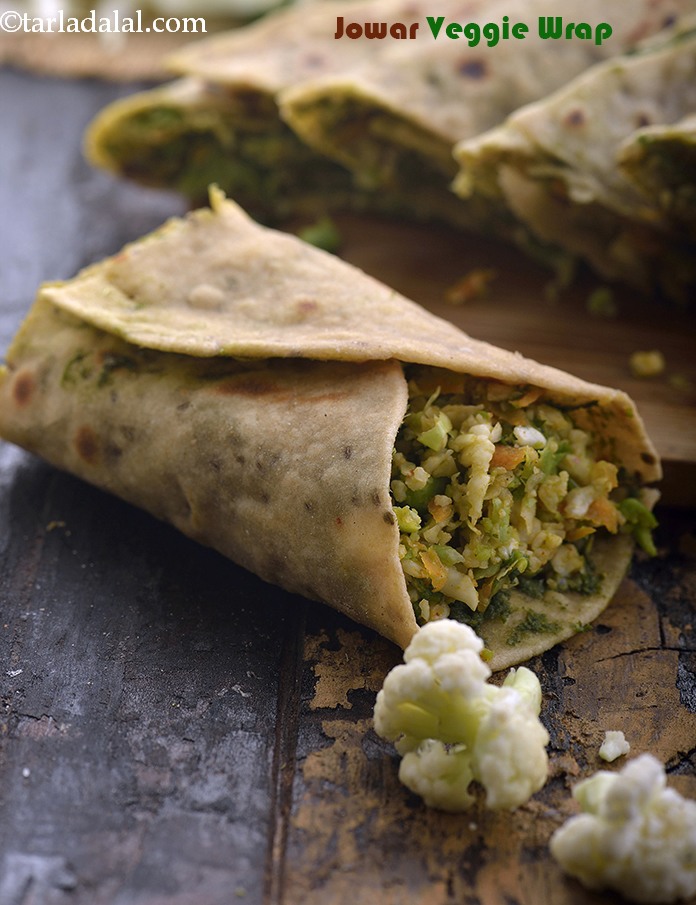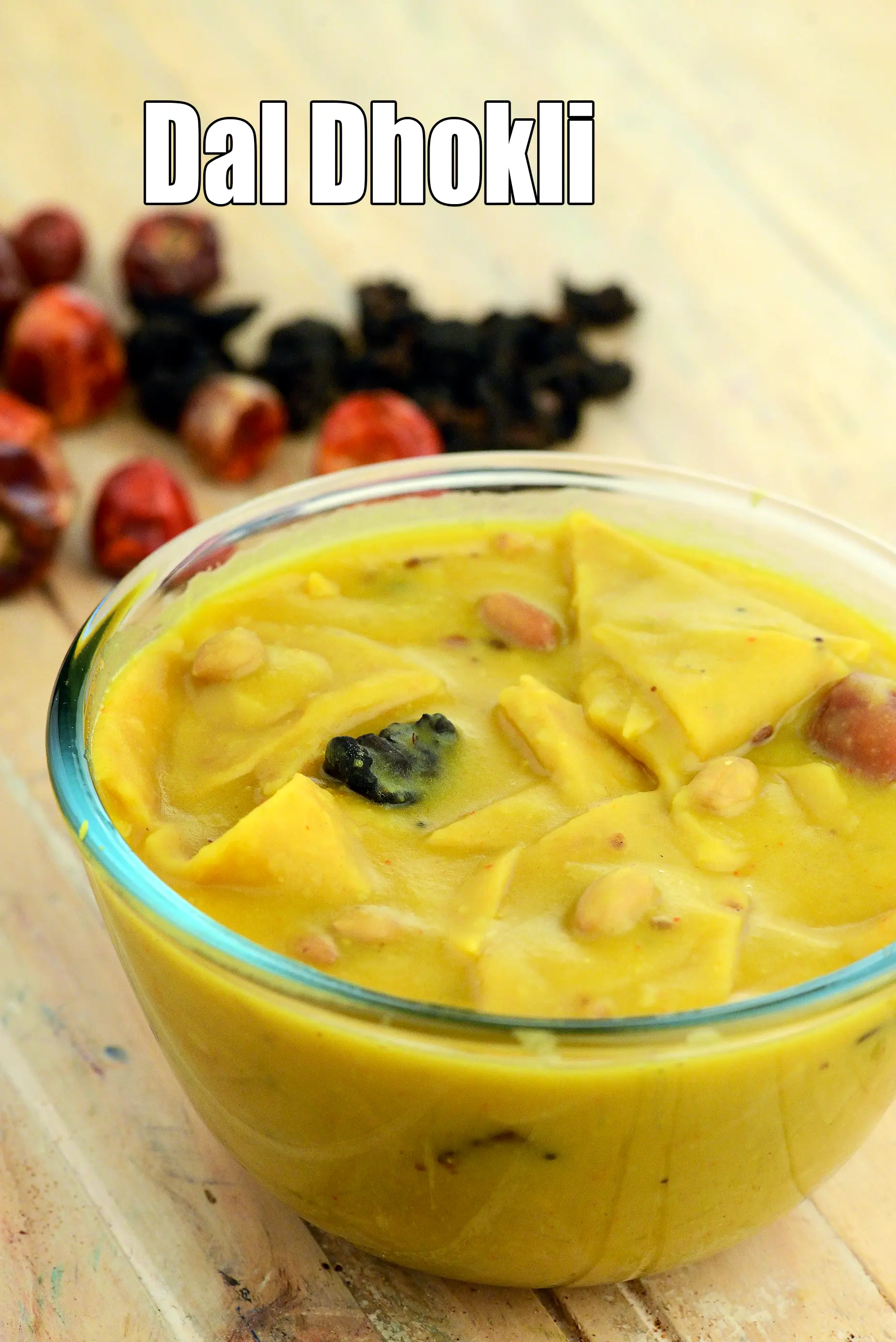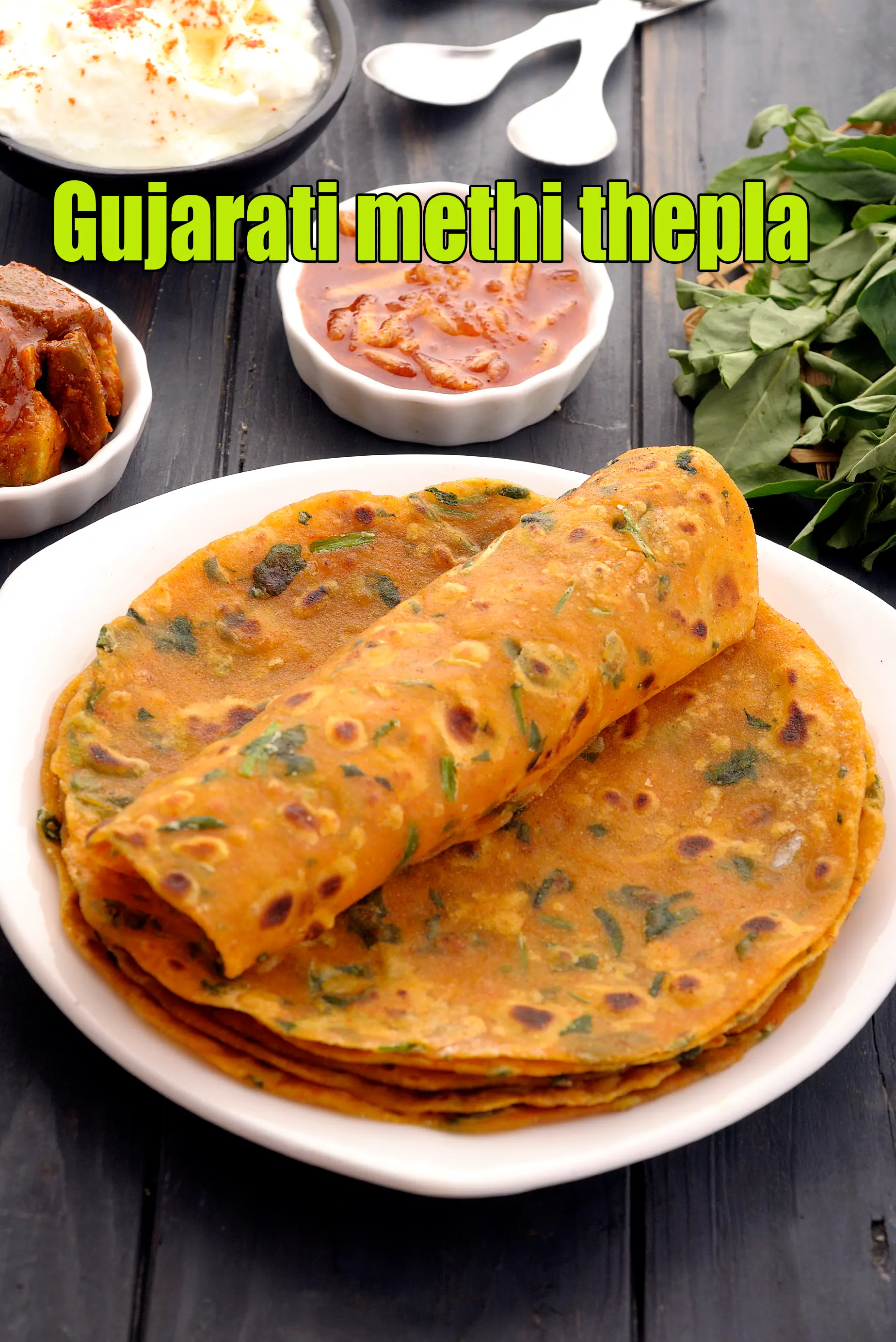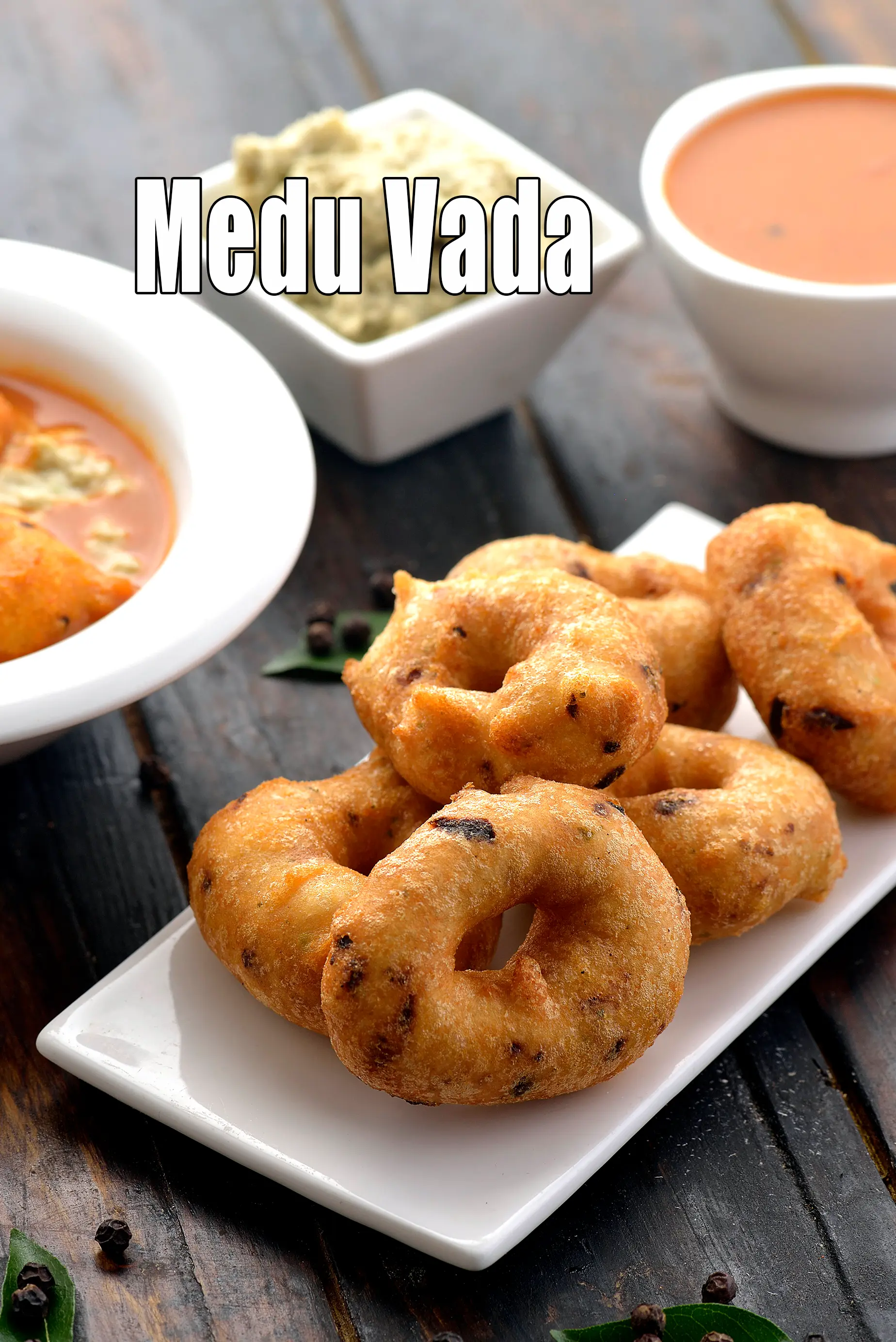Nutritional Facts of Jowar Veggie Wrap, Calories in Jowar Veggie Wrap
This calorie page has been viewed 4653 times
Healthy Indian Recipes
Healthy Indian Recipes
Course

How many calories does one Jowar Veggie Wrap have?
One Jowar Veggie Wrap gives 130 calories. Out of which carbohydrates comprise 88 calories, proteins account for 16 calories and remaining calories come from fat which is 28 calories. One Jowar Veggie Wrap provides about 6 percent of the total daily calorie requirement of a standard adult diet of 2,000 calories.
See Jowar Veggie Wrap recipe. The Jowar Veggie Wrap is a one meal dinner recipe that is sure to satiate you, with both flavour and nutrition.
The Jowar Veggie Wrap rotis are made of jowar and whole wheat flour, tinged with the peppy flavour of carom seeds. The carom seeds also help improve digestion.
These jowar vegetable rotis are tastefully packed with a stuffing of cauliflower and other veggies, spiced mildly with just half a teaspoon of chilli powder. The green chutney should be mildly spiced or else it might provoke acidity in this acidity friendly roti, Jowar Vegetable Wrap.
See why this is a healthy jowar vegetable roti? Jowar flour which is known for its alkaline nature is combined in double quantity with wheat flour to make the nourishing rotis of this Jowar Veggie Wrap. A hint of carom seeds aids in digestion and thus soothes the stomach.
Notes on Indian sorghum veg wrap. 1. Wheat flour is best combined with jowar flour, instead of using it solely, to control acidity. In these rotis, wheat flour will also make the process of rolling and making the wrap easier. 2. Add carom seeds to the batter. Also called as ajwain, these are known for their digestive property and ability to prevent bloating. So don’t miss out on this ingredient. 3. Keep the Jowar Roti dough aside for 5 to 10 minutes if possible. This makes rolling smoother. 4. We prefer you use peanut oil. Peanut oil has the highest amount of MUFA (around 49%) amongst most common Indian cooking oils and its good you start using it in your rotis.
You can have a go at other stomach-friendly snacks like Mini Jowar and Tomato Uttapa or Buckwheat Dhokla.
Is Jowar Veggie Wrap healthy?
Yes, this is healthy. But restrictions apply to some.
Let's understand the Ingredients.
What's good.
1. Jowar Flour : Jowar is a complex carb and will be absorbed slowly in the blood stream and not cause a spike in insulin. Jowar and all Millets are rich in Potassium. Potassium is critical for those with High Blood Pressure as it lessens the impact of sodium. Hence a good safe food for diabetics but to be had in restricted quantity and safe for those who want to live and eat healthy. Being high in Fibre, Jowar reduces bad cholesterol (LDL) and increases the effects of good cholesterol (HDL). See 17 benefits of jowar and why you should have it.
2. Whole Wheat flour : Whole wheat flour is excellent for diabetics as they will not shoot up your blood sugar levels as they are a low GI food. Whole wheat flour is rich in Phosphorus which is a major mineral which works closely with calcium to build our bones. Vitamin B9 helps your body to produce and maintain new cells, especially increase red blood cells. See detailed 11 benefits of whole wheat flour and why it's good for you.
3. Cauliflower (gobi) : Cauliflower is extremely low in carbs and therefore does not raise blood glucose levels. One cup Cauliflower provides you 100% off your daily recommended allowance of Vitamin C. Rich in Antioxidant. Being rich in Indoles, Cauliflower and other Cruciferous Vegetables like broccoli, kale, radish, brussel sprouts, red cabbage) maintain Estrogen balances which is crucial for women. Read here for detailed benefits of cauliflower.
4. Carrots (gajjar) : Carrots have the nutrient Beta Carotene which is a form of Vitamin A, helps prevent deterioration of the eye as one gets older and prevents night blindness. Carrot is great for the eyes.They relieve constipation, lower blood pressure, have fibre and lower cholesterol. Read the 11 super benefiits of carrots and why to include in your daily diet.
5. Cabbage ( Gobhi) : Cabbage is low in calories, relieves constipation, good for diabetics. Cabbage has high levels of flavonoids and anthocyanins and has long been used as a herbal medicine. Rich in Antioxidants in turn lowers the risk of infection and inflammation of the body due to eating processed foods. See here all benefits of cabbage.
6. Coriander (kothmir, dhania) : The antioxidants vitamin A, vitamin C and the quercetin present in coriander works towards strengthening our immune system. Coriander is a fairly good source of iron and folate – the 2 nutrient which help in the production and maintenance of red blood cells in our blood. Good for reducing cholesterol and good for diabetics. Read 9 benefits of coriander to understand details.
What's the problem?
Potatoes (Aloo) : Potatoes being high in simple carbohydrates will lead to weight gain and are not good for people with diabetes, heart problem and obesity. Potatoes are recommended for malnourished children and people with low weight. See full details on why potatoes are bad for you.
Can diabetics, heart patients and over weight individuals have Jowar Veggie Wrap?
Yes, this recipe is good for diabetics, heart and weight loss BUT drop the potatoes in the recipe. Jowar is a complex carb and will be absorbed slowly in the blood stream and not cause a spike in insulin. Jowar and all Millets are rich in Potassium. Potassium is critical for those with High Blood Pressure as it lessens the impact of sodium. Whole wheat flour used to make the wrap is excellent for diabetics as they will not shoot up your blood sugar levels as they are a low GI food.
Can healthy individuals have Jowar Veggie Wrap?
Yes, but drop the potatoes or use less quantity.
Jowar Veggie Wrap is high in
1. Vitamin C : Vitamin C is a great defence against coughs and colds.
2. Phosphorous : Phosphorous works closely with calcium to build bones.
Note : a recipe is deemed high in a Vitamin or mineral if it meets 20% and above the recommended daily allowance based on a 2,000 calorie diet.
How to burn 130 calories that come from Jowar Veggie Wrap?
Walking (6 kmph) = 39 mins
Running (11 kmph) = 13 mins
Cycling (30 kmph) = 17 mins
Swimming (2 kmph) = 22 mins
Note: These values are approximate and calorie burning differs in each individual.
| Energy | 130 cal |
| Protein | 3.9 g |
| Carbohydrates | 22 g |
| Fiber | 4.7 g |
| Fat | 3.1 g |
| Cholesterol | 0 mg |
| Vitamin A | 724.4 mcg |
| Vitamin B1 | 0.1 mg |
| Vitamin B2 | 0.1 mg |
| Vitamin B3 | 1.3 mg |
| Vitamin C | 34.9 mg |
| Folic Acid | 36.7 mcg |
| Calcium | 58.8 mg |
| Iron | 3.1 mg |
| Magnesium | 51.6 mg |
| Phosphorus | 143.3 mg |
| Sodium | 21.4 mg |
| Potassium | 144.9 mg |
| Zinc | 0.6 mg |

Click here to view Jowar Veggie Wrap
Calories in other related recipes












